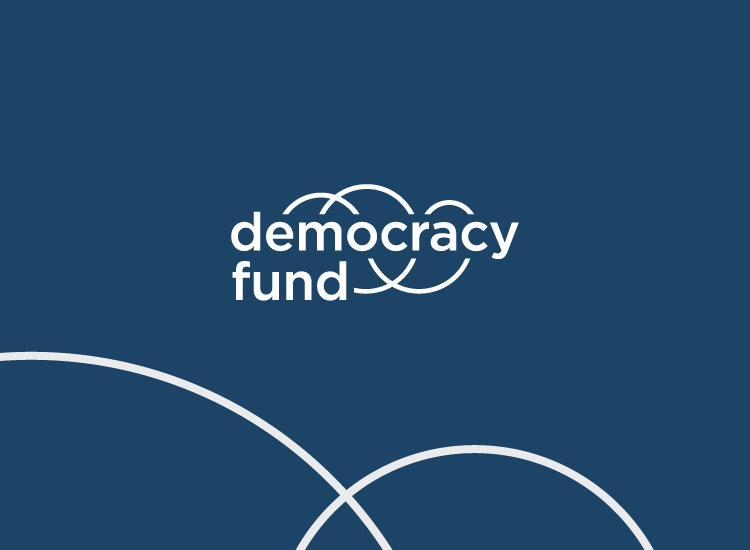How We Learn
At Democracy Fund, we believe our democracy is a complex, imperfect system — a work in progress. As funders, we want to be responsible with our dollars. Our strategy and learning practice helps us ensure that our grantmaking is backed by evidence. We are committed to driving lasting impact, grounded in the understanding that a multiracial nation requires a democracy that serves all of us. Moving toward our vision of an inclusive, multi-racial democracy demands innovative strategies and regular adaptation. This ethos is central to the grantmaking approach of our affiliate organization, The Omidyar Group.
As we seek impact, we prioritize continuous learning to help us build and adapt our strategies over time. By “us” we mean our staff, our board, philanthropic partners, and most importantly our grantee partners who develop and enact strategies in the field and who hold the central expertise of both the problems and solutions.
With a deep commitment to learning, we acknowledge that we don’t know all the answers. We use participatory, inclusive, and emergent processes to see patterns instead of only problems, explore and refine hypotheses, and document ongoing decisions and updated thinking about influencing change. By using systems thinking to understand the challenges facing our democracy, we aim to make sense of complexity and improve the conditions that will lead to the inclusive, multi-racial democracy to which we all aspire.
Our Approach to Systems and Complexity
Democracy Fund practices strategic planning and learning that holistically analyzes complex issues. This means we recognize that the forces shaping U.S. democracy are constantly changing and interacting, often in unpredictable ways. We avoid oversimplifying the problems we are trying to solve or holding onto linear theories of change. Instead, we spend time building relationships and strategies with those working in the democracy field and the communities most impacted by America’s flawed system.
We try to understand patterns at the root of problems and identify potential interventions to improve conditions and create positive change. Our relationships with grantees and partners in the field create feedback loops that inform our understanding of the challenges facing democracy and reveal promising solutions.
While many of us in philanthropy hope to see transformative improvement, we know that this isn’t the only way to impact a system’s health. We have six different impact models that can be applied in different situations, and we set our goals based on the outcomes we expect from the most appropriate impact model for a portfolio of work.
Because the system is constantly changing, we continually take time to reflect and learn, which helps us make evidence-informed shifts to our strategies. Our organization’s strategies are formally approved on five-year cycles, but our learning occurs daily. We adapt our strategies as our understanding of system dynamics is updated. Our work is rooted in Democracy Fund’s long-term vision for the future, which includes:
- A just and inclusive society that has reckoned with structural racism,
- Equal participation, voice, and power for communities of color,
- Representative and accountable governing institutions, and
- Vibrant information ecosystems that meet the civic needs of communities.
Our Strategy, Impact, and Learning Values
Our strategy, impact, and learning (SIL) values are the guiding principles for Democracy Fund’s approach. Our SIL practice seeks to:
Make our strategies more effective
Our learning practice calls us to ask hard questions of ourselves and one another in a way that fosters trust and curiosity. We create space to reflect and draw connections across our work, and we use what we learn to inform both short- and long-term decisions.
Be inclusive
We engage with a range of internal and external perspectives and we strive to challenge power dynamics that affect learning and decision-making, especially regarding racial equity. We work to model transparency and co-learning with our grantees, encouraging two-way communication about what they and we are learning.
Add value to the field
We aim to be transparent about what we are learning and responsive to the needs of peer donors and the field. We do not ask our grantees for data that we do not use, and we work to ensure that the reporting we request and produce adds value to the field. We regularly publish evaluation reports, lessons learned, and other SIL-related information, making insights accessible.
Inform adaptation
Democracy Fund’s organizational strategy establishes goals and lays out our best hypotheses for how we might make progress toward them. Our learning practice regularly assesses the progress we are making and supports shifts in approach when backed by evidence.
Embrace complexity
We recognize the holistic, integrated, and ever-changing nature of the systems in which we work. Our SIL practice encourages rigor of inquiry and evidence collection, and balances this with intellectual humility in the conclusions we draw about our strategy and impact. We temper our expectations for impact with the awareness that change in complex systems is usually non-linear, unpredictable, and emergent.
Support accountability
To us, accountability means telling the story of our work and the change it has created in the world. We make our rationale, assumptions, and choices explicit, and compare them against real-world results. We seek contribution, not attribution, and we collect both confirming and refuting evidence of impact through a variety of methods. We share our accounts with one another, our board, and our partners in the field. In doing so, we push back against the lack of accountability inherent in philanthropy and strive to be more accountable to the public at large.
Our Learning Habits
Democracy Fund’s strategy and learning approach is not just a formal process led by a few experts at Democracy Fund. It is made up of daily habits practiced by all our organization’s staff in relationship with our grantees and partners. We invite others in the field to join us in practicing these learning habits:
Make our thinking visible
We are transparent about our strategic goals and the reasoning behind them. We are always seeking to improve the way we explain our goals and decisions to our partners.
Ask powerful questions
We value inquiry and dialogue. We still appreciate data, but we want to understand the data that is relevant to our grantees and learn with them. Regardless of the format, we approach grantees and partners with curiosity and humility.
Explore how actions lead to outcomes
We create learning plans for all of our grantmaking initiatives. This enables us to regularly document activities and accomplishments as well as scan the areas we focus on within democracy to see what is changing and why.
Combat our biases
We intentionally seek out evidence and information that challenges our assumptions and provides different perspectives.
Answer the “now what” questions
We hold space for reflection and sensemaking to consider what we are learning and what it means for our work. Our learning practice is designed to feed seamlessly into decision-making.
Learning habits adapted from the Center for Evaluation Innovation’s framework.
Contact Us
Are you interested in learning more about Democracy Fund’s SIL practice? We’d be happy to connect!



